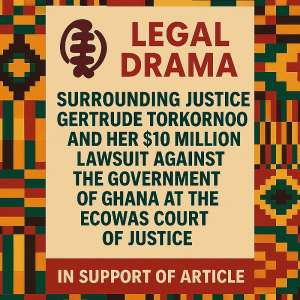
Here’s a simplified breakdown of the legal drama surrounding Justice Gertrude Torkornoo and her $10 million lawsuit against the Government of Ghana at the ECOWAS Court of Justice:
⚖️ What’s Happening?
Justice Torkornoo, Ghana’s suspended Chief Justice, says her suspension was unfair and violated her human rights. She’s taken the matter to ECOWAS—a regional court that handles human rights issues across West Africa.
She’s asking for:
🛑 Her suspension to be reversed 💵 $10 million in compensation for damage to her reputation 🧾 Clear rules for how a Chief Justice should be investigated
🧠 What Does It Mean for Ghana?
1. Human Rights Accountability
If ECOWAS rules in her favor, Ghana could be seen as violating:
The right to a fair hearing The right to dignity The right to work under fair conditions
This could damage Ghana’s reputation in the region and internationally.
2. Judicial Independence
The case raises questions about whether Ghana’s judiciary is truly free from political interference. If the suspension is found to be politically motivated or procedurally flawed, it could shake public trust in the system.
3. Constitutional Clarity
The suit demands that Ghana clearly define how to investigate a Chief Justice. If ECOWAS agrees, Ghana may be forced to rewrite or clarify its laws to protect future officeholders.
👩🏽⚖️ What Does It Mean for Justice Torkornoo?
If she wins, she could be reinstated and cleared of wrongdoing. The $10 million claim is for emotional and reputational damage—not just money, but a statement of how deeply she feels wronged. Her case could set a precedent for how high-ranking officials are treated in Ghana and across ECOWAS countries.
🗣️ In Plain Terms
Imagine being suspended from your job without being told why, and then being investigated by people who might be biased. That’s what Justice Torkornoo says happened to her. She’s now asking a regional court to step in and say, “This isn’t fair.”
If the court agrees, Ghana may have to:
Apologize Pay damages Change how it handles such cases in the future
If the ECOWAS Court of Justice rules against Justice Gertrude Torkornoo, the outcome carries weighty legal, political, and civic implications—especially for Ghana’s judiciary and citizens’ perception of due process. Here’s how it unfolds for both parties:
⚖️ Legal Implications for Justice Torkornoo
1. Reinforced Suspension
Her status as suspended Chief Justice remains legally upheld. She may lose the opportunity for reinstatement or public exoneration.
2. No Compensation
The $10 million claim for damages would be rejected. Her reputation may remain clouded, unless restored by other legal or civic channels.
3. Precedent Against Similar Claims
Her case could discourage future human rights challenges by top officials—especially when internal remedies haven’t been exhausted.
🇬🇭 Implications for Ghana
1. Government Vindication
The ruling may validate Ghana’s disciplinary actions and procedures. It could signal that constitutional mechanisms are sufficient and not in conflict with regional human rights law.
2. Judicial Autonomy Affirmed (or Questioned)
If the court finds no violation of judicial independence, it may suggest that the Executive acted within bounds. Alternatively, it could spark civic debate about how transparent and fair current disciplinary procedures truly are.
3. Public Perception
Some may view the ruling as a blow to justice and accountability—especially if there’s a sense that deeper truth was left unexamined. Others might interpret it as a necessary affirmation of national sovereignty in managing internal affairs.
🧭 For Citizens and Democracy
This moment becomes a civic test—not just for how we choose leaders, but for how we honor institutions, seek accountability, and strengthen rule of law. Whether she wins or not, Justice Torkornoo’s case remains a powerful prompt for:
Reviewing our constitutional safeguards Demanding clarity and transparency in high office proceedings Educating the public on legal rights and democratic standards


